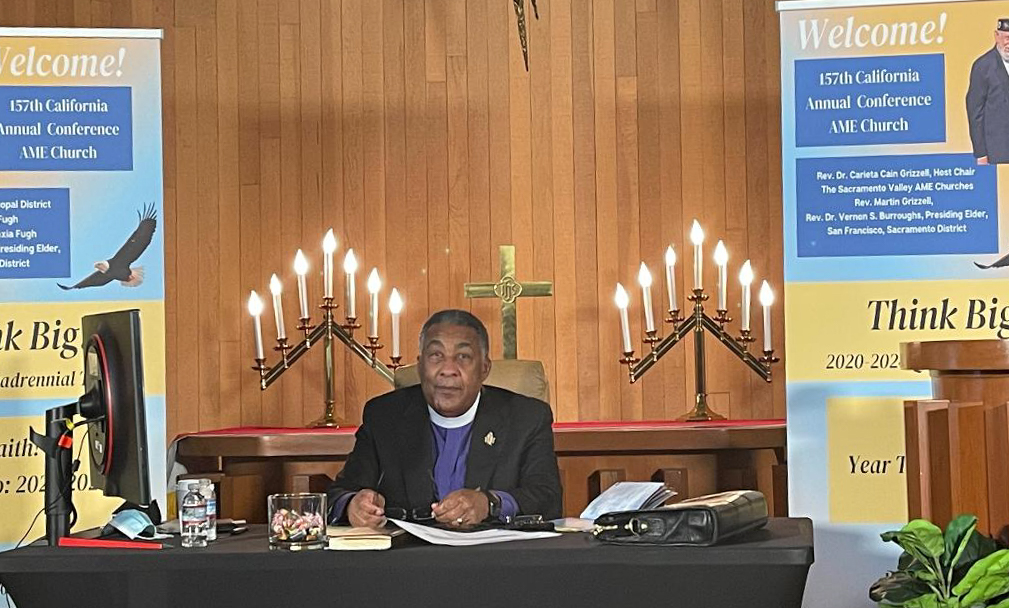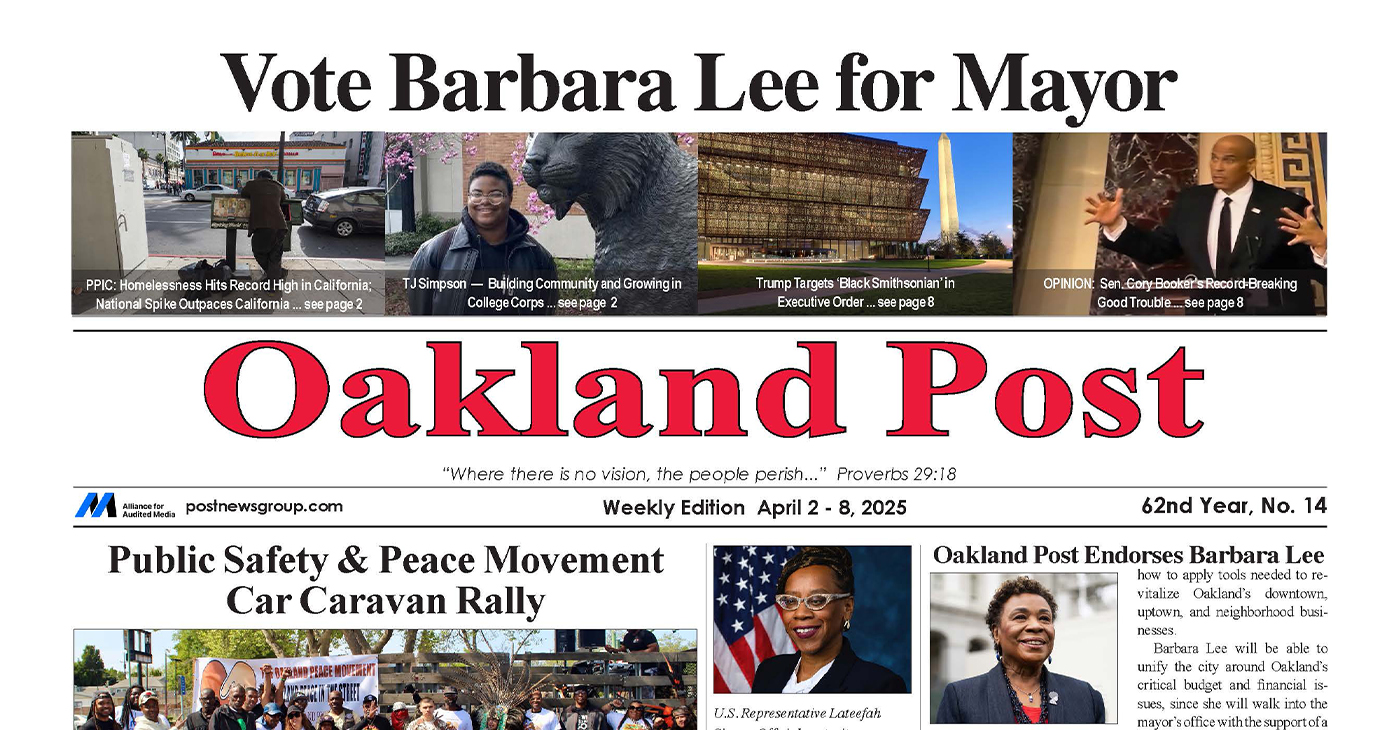Community
The 157th Session of the AME Church’s California Annual Conference: Not Just Business as Usual
For the 157th time in history, the African Methodist Episcopal Church in California met to report at the call of their bishop, the Right Reverend Clement W. Fugh, which, for the first time was held both on-line and in person from Bethel AME Church at 916 Laguna St. in San Francisco.

For the 157th time in history, the African Methodist Episcopal Church in California met to report at the call of their bishop, the Right Reverend Clement W. Fugh, which, for the first time was held both on-line and in person from Bethel AME Church at 916 Laguna St. in San Francisco.
The renowned presiding elders, Rev. Dr. Harold R. Mayberry and Rev. Dr. Vernon S. Burroughs, middle managers of this portion of Bishop Fugh’s charge, shared the accounts of their respective territories at the AME Church’s California Annual Conference via prerecorded videos at the meeting hosted by Churches of the Sacramento Valley.
The lead congregation from the valley was Murph-Emmanuel A.M.E. Church in North Highlands, CA, which is pastored by Rev. Dr. Carieta Cain Grizzell, whose spouse Rev. Martin Grizzell is also known for his past ministry in the Bay Area. The venue church is served by the pastoral team of Rev. Robert R. Shaw and his partner, Assistant Pastor, Rev. Ann Champion Shaw. Murph-Emmanuel and Bethel A.M.E. Church were acclaimed by Bishop Fugh for their cooperation in this session of the California Annual Conference.
Bethel A.M.E San Francisco looked like a television set had grown into the sanctuary, complete with multiple lights and cameras. There was a technical team (in person and on-line) primarily made up of young adult members of AME churches under the purview of the bishop. The meeting was a clear, joint effort of both clergy and lay people, more than in past years. Though the California Annual Conference has long made a point of including non-cleric church members, young and old, the COVID-19 pandemic circumstances have clearly advanced the Conference’s inclusivity.
“The Word of God is Colorblind,” said Bishop Fugh during the retirement portion of the Annual Conference which honored the retirement of the host pastor. The diversity within churches of the California Annual Conference was on display at this 157th session of this historic meeting and it was clear that the leadership encourages the welcoming of all who would like to join with the church.
There was an apparent focus on meeting safely, with limitations on those allowed to join in person. Attestations related to COVID-19 were required of registrants and a screening process was administered at the venue. The bishop commended the venue leadership and church for the dignity that was maintained during the process.
Registration for Zoom attendance was also a painless process and open to whomever desired to attend the Webinar. The conference was accessible on Facebook as well as YouTube. The bishop also encouraged churches to make attendance as safe as possible while keeping the process simple and focusing on a quality worship experience. Bishop Fugh set a goal for represented churches to reopen their sanctuaries by the first Sunday of November.
This session of the California Annual Conference carried with it the long-standing traditions of the first Christian denomination founded in response to social injustice over 200 years ago. The ministries reported primarily using pre-recorded videos this year as it all followed through decently and in order. Indeed, there was a genuine spirit of love during the conference.
#NNPA BlackPress
Lawmakers Greenlight Reparations Study for Descendants of Enslaved Marylanders
BLACKPRESSUSA NEWSWIRE — Maryland lawmakers have approved Senate Bill 587, authorizing the creation of the Maryland Reparations Commission.

By Stacy M. Brown
BlackPressUSA.com Senior National Correspondent
Maryland lawmakers have approved Senate Bill 587, authorizing the creation of the Maryland Reparations Commission. The body will study and make recommendations for reparations to descendants of enslaved people and others harmed by centuries of discriminatory policies. The legislation now awaits the governor’s signature and is scheduled to take effect July 1, 2025. The commission will examine Maryland’s long history of slavery, the economic and social systems that benefited from it, and the lingering impacts of those institutions. Its work will include recommendations on financial compensation, housing and business support, tuition waivers, and other forms of restitution. “This commission is not only about acknowledging our past – it’s about using that understanding to pave the way for a more equitable and fair future,” said Del. Jheanelle Wilkins, Chair of the Legislative Black Caucus of Maryland, which made reparations a top priority for the first time this legislative session.
From its founding in 1634 until the abolition of slavery in 1864, Maryland was a society built on slave labor. Tobacco, the colony’s staple crop, fueled economic growth and political dominance for the state’s elite. By the mid-18th century, nearly one-third of Maryland’s population was enslaved. Skilled and unskilled laborers like Frederick Douglass, who caulked ships in Baltimore, contributed to the state’s prosperity under brutal conditions. The legacy of that bondage continued to echo across generations. Del. Aletheia McCaskill, the lead sponsor of the House version of the bill, said the measure lays the groundwork for redress. “I am overjoyed at the passage of this monumental legislation,” McCaskill said. “This commission will gather historical evidence, examine present-day disparities, and provide a data-driven framework to acknowledge past harms. By recommending policies and developing solutions to repair the damage done, we can take meaningful steps toward true equity in our state.”
Sen. C. Anthony Muse, sponsor of the Senate version, called the passage historic. “We took a historic step towards justice and healing for our communities,” Muse remarked. “The passage of Maryland Senate Bill 587 marks a significant commitment to addressing the long-lasting effects of slavery and systemic inequities.” The commission’s membership will include lawmakers, historians, HBCU scholars, civil rights experts, representatives from the NAACP and the Maryland Black Chamber of Commerce, and members of the public. It will examine reparations programs in other states and recommend procedures for verifying eligibility and the feasibility of funding and distributing reparations. Maryland’s history makes it a powerful setting for this initiative. The state witnessed the forced transport of nearly 100,000 Africans during the 18th century. The rise of tobacco plantations led to a devastating regime marked by family separation, disease, forced labor, and systemic brutality. Enslaved individuals in Maryland built canals, smelted iron, and helped fuel the economic engine of the state while living under constant threat of sale or violence. The stories of individuals like Hillery Kane at Sotterley Plantation and Lucy Jackson at Hampton Mansion reveal not only the cruelty of slavery but also the resilience and resistance of the enslaved.
By the 19th century, Maryland became a central player in the domestic slave trade, with an estimated 20,000 people sold to cotton plantations in the Deep South between 1830 and 1860. Even after emancipation in 1864, freed Black Marylanders faced decades of disenfranchisement, segregation, and economic exclusion. “This is about more than history,” Wilkins said. “It’s about how that history has shaped the realities of today.” The commission will submit a preliminary report by January 1, 2027, and a final report by November 1, 2027. It will explore possible sources of funding, such as businesses and institutions that benefited from slavery and discriminatory government practices.
Opposition to the bill has centered mainly on its cost, but the fiscal note details only a modest increase of $54,500 in 2026 to fund contractual staff. No reparations payments are authorized under the current bill. Maryland is joining California, Colorado, Illinois, Massachusetts, and New York in forming a reparations commission. The move comes as diversity, equity, and inclusion initiatives face increasing national scrutiny and political attacks. Still, supporters of the commission insist the time for reckoning is now. “We’re not just commemorating the past,” McCaskill said. “We are charting a course toward justice, informed by our truth and grounded in our responsibility to future generations.”
#NNPA BlackPress
Harris, Obama, and Booker Step Up as Resistance Against Trump Takes Shape
BLACKPRESSUSA NEWSWIRE — Obama, meanwhile, broke his silence during an appearance at Hamilton College in New York, offering one of his sharpest public critiques yet of Trump’s second administration.

By Stacy M. Brown
BlackPressUSA.com Senior National Correspondent
Is the resistance finally taking form?
As Kendrick Lamar asked during his powerful Super Bowl performance, “Are we really about to do it?” That question now echoes in the political arena as former President Barack Obama and former Vice President Kamala Harris have entered the public fray, joining voices like New Jersey Sen. Cory Booker and Texas Rep. Jasmine Crockett in confronting President Donald Trump and his administration’s sweeping changes head-on. After months of relative silence following her defeat to Trump last November, Harris returned to the spotlight Thursday during a rare appearance at the Leading Women Defined conference at a seaside resort in Dana Point, California. According to The Los Angeles Times, she didn’t mention Trump by name but spoke forcefully about the anxiety many Americans are experiencing under his new administration.
“There is a sense of fear that is taking hold in our country, and I understand it,” Harris said. “These are the things that we are witnessing each day in these last few months in our country, and it understandably creates a great sense of fear. Because, you know, there were many things that we knew would happen, many things.” “I’m not here to say, ‘I told you so,’” she continued. “I swore I wasn’t going to say that.” The appearance marked a shift in tone for Harris, who has been weighing a potential run for governor of California in 2026 or waiting until 2028 for another shot at the presidency. Still, she clarified that her political silence hasn’t equated to surrender. “We can’t go out there and do battle if we don’t take care of ourselves and each other,” Harris told the crowd. “I’ll see you out there. I’m not going anywhere.”
Obama, meanwhile, broke his silence during an appearance at Hamilton College in New York, offering one of his sharpest public critiques yet of Trump’s second administration. He condemned Trump’s attempts to reshape the federal government, stifle dissent, and punish those who oppose his policies. “So, this is the first time I’ve been speaking publicly for a while,” Obama said. “I’ve been watching for a little bit.” “Imagine if I had done any of this,” Obama added. “It’s unimaginable that the same parties that are silent now would have tolerated behavior like that from me or a whole bunch of my predecessors.” While calling Trump’s proposed tariffs bad for America, Obama said his larger concern lies with what he described as the White House’s alarming overreach.
“I’m more deeply concerned with a federal government that threatens universities if they don’t give up students who are exercising their right to free speech,” he said. “The idea that a White House can say to law firms, if you represent parties that we don’t like, we’re going to pull all our business or bar you from representing people effectively. That kind of behavior is contrary to the basic compact we have as Americans.” Obama, who campaigned for Harris during the final stretch of the 2024 election, had warned that a second Trump term would endanger the nation’s democratic norms. “Just because [Trump] acts goofy,” Obama said at the time, “doesn’t mean his presidency wouldn’t be dangerous.” With Trump’s second term underway, the voices of resistance are growing louder.
Sen. Cory Booker added fuel to the movement by making history on the Senate floor. He delivered a 25-hour, 5-minute filibuster that broke the record previously held by segregationist Sen. Strom Thurmond. Thurmond’s 1957 filibuster—lasting 24 hours and 18 minutes—was aimed at blocking the Civil Rights Act. Booker used his record-breaking speech to denounce what he called a deliberate dismantling of government at the hands of Trump, Elon Musk, and Congressional Republicans. “It always seemed wrong,” Booker said, referring to the Senate room still named after Thurmond. “It seemed wrong to me when I got here in 2013. It still seems wrong today.”
The New Jersey senator, a descendant of both enslaved people and slave owners, framed his marathon speech as a moral plea, reading letters from Americans affected by deep cuts and policy threats to Medicare, Medicaid, Social Security, and SNAP. “This is a moral moment,” Booker declared. “It’s not left or right; it’s right or wrong.” With Booker’s record-setting stand, Harris’s reemergence, and Obama’s warning shots, what once felt like fragmented frustration among Democrats may now be coalescing into something more deliberate: a resistance that is finally, visibly, on the move. “I’ll see you out there,” Harris said. “I’m not going anywhere.”
Activism
Oakland Post: Week of April 2 – 8, 2025
The printed Weekly Edition of the Oakland Post: Week of April 2 – 8, 2025

To enlarge your view of this issue, use the slider, magnifying glass icon or full page icon in the lower right corner of the browser window.
-

 Activism2 weeks ago
Activism2 weeks agoWe Fought on Opposite Sides of the Sheng Thao Recall. Here’s Why We’re Uniting Behind Barbara Lee for Oakland Mayor
-

 Activism4 weeks ago
Activism4 weeks agoOakland Post: Week of March 5 – 11, 2025
-

 #NNPA BlackPress2 weeks ago
#NNPA BlackPress2 weeks agoRev. Dr. Jamal Bryant’s Black Church Target Boycott Mobilizes 150,000
-

 Activism3 weeks ago
Activism3 weeks agoSan Francisco Is Investing Millions to Address Food Insecurity. Is Oakland Doing the Same?
-

 #NNPA BlackPress2 weeks ago
#NNPA BlackPress2 weeks agoRecently Approved Budget Plan Favors Wealthy, Slashes Aid to Low-Income Americans
-

 #NNPA BlackPress4 weeks ago
#NNPA BlackPress4 weeks agoFighting to Keep Blackness
-

 Activism2 weeks ago
Activism2 weeks agoFaith Leaders Back Barbara Lee for Mayor, Criticize Candidate Loren Taylor for Dishonest Campaigning
-

 Activism3 weeks ago
Activism3 weeks agoOakland Post: Week of March 12 – 18, 2025






















































